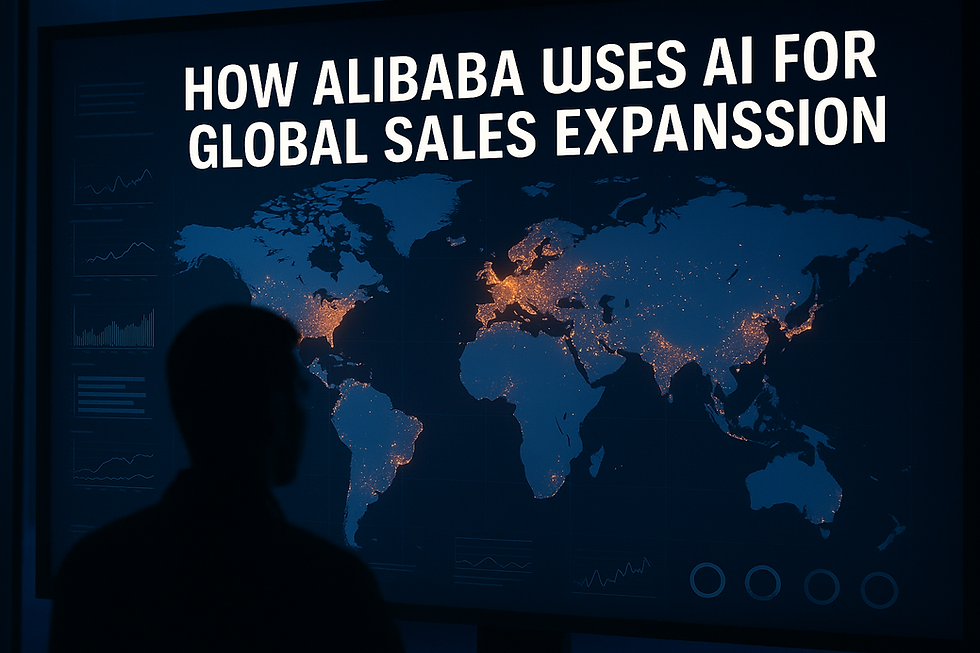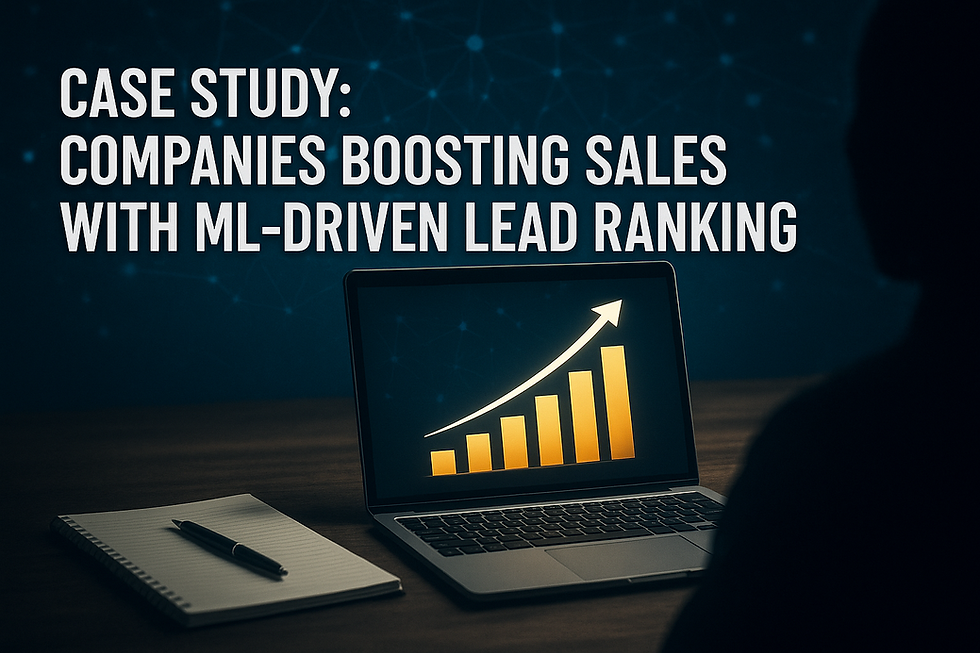How Alibaba Uses AI for Global Sales Expansion
- Muiz As-Siddeeqi

- Aug 19, 2025
- 5 min read

How Alibaba Uses AI for Global Sales Expansion
They didn’t build an empire by selling cheap gadgets. They didn’t conquer global markets just by creating a marketplace. Alibaba grew into one of the world’s largest e-commerce powerhouses by mastering one thing: intelligent scalability. And the secret fuel behind that scale—AI.
But not the kind of AI we throw around in buzzwords. Not generic “smart systems.” Alibaba’s approach to AI is one of the most real, most documented, and most commercially aggressive use cases of artificial intelligence anywhere in the business world today.
This isn’t a hypothetical tale. This is the reality of Alibaba AI sales expansion—a strategy that has helped them sell billions of dollars’ worth of products, optimize operations across dozens of countries, and power record-breaking global sales events.
This is not a story of what could happen. This is the story of what has already happened. This is real. This is happening. And this is exactly how they did it.
Bonus: Machine Learning in Sales: The Ultimate Guide to Transforming Revenue with Real-Time Intelligence
The Moment That Changed Everything: Singles’ Day 2017
Let’s not start small.
In 2017, during Alibaba’s famous Singles’ Day (Double 11) shopping festival, they sold $25.3 billion worth of goods in just 24 hours.
Yes. $25.3 billion. In. A. Day.
But what many missed in the headlines was this: 70% of the orders were powered by AI-driven product recommendations on Alibaba’s platforms, including Tmall and Taobao.
Alibaba's CTO at the time, Jeff Zhang, confirmed in a press conference that their AI engines handled:
Personalized product rankings
Dynamic pricing decisions
Predictive logistics planning
Fraud detection in real-time
Voice-assisted customer service
And all of this happened without crashing the system or slowing down the user experience. No manual intervention. Just clean, invisible automation—at global scale.
From Hangzhou to the World: How Alibaba’s AI Took Over International Markets
Alibaba isn’t just about China anymore. It’s about cross-border domination.
As of 2024, Alibaba operates retail platforms and logistics networks in Southeast Asia (Lazada), South Asia (Daraz), Europe (AliExpress), and the Middle East (through partnerships with Noon and others). What powers this expansion? AI.
Let’s break it down.
AI in Language: Real-Time Multilingual Product Listings
When Alibaba wanted to expand to Europe, language barriers were a nightmare. Sellers in China list products in Mandarin. Buyers in Spain, Germany, or France needed perfect translations. That’s where Alibaba deployed its Natural Language Processing (NLP) engine, built in-house.
Their tool, AliNLP, automatically translates product titles, descriptions, reviews, and even customer questions in real-time across 16+ languages.
Real stat: As per Alibaba Cloud’s 2023 documentation, this reduced buyer drop-off rates by 35% in non-English speaking markets.
Real impact: AliExpress now supports 230 countries and regions with localized content—entirely automated via AI.
AI in Visuals: Image Search and AI-Generated Product Descriptions
In international markets, typing product names can get tricky. So Alibaba introduced visual search tools, where users simply upload a photo—and the AI finds matching products in milliseconds.
AliExpress’s AI-powered image recognition engine was upgraded in 2022. According to their official R&D blog:
“We now process over 60 million image-based searches every month across global users.”
Additionally, Alibaba’s system auto-generates product descriptions based on images, using computer vision + generative models.
And yes—it’s all real. This isn’t hypothetical. This is part of their documented AI toolset.
AI in Forecasting: Demand Prediction Across Borders
Global sales mean global logistics. But if you overstock in Paris and understock in Jakarta, you lose.
That’s why Alibaba implemented AI-powered demand forecasting models. These models learn from:
Search trends
Seasonality
Cultural events
Currency fluctuations
Local weather
Social media chatter
In 2023, Alibaba’s logistics arm, Cainiao, revealed in their annual report that AI forecasting improved overseas inventory placement accuracy by 45%, resulting in a 12% increase in international sales efficiency.
AI in Logistics: Smarter Routes, Faster Deliveries
Alibaba’s global logistics is managed by Cainiao, which delivers across 200+ countries.
Cainiao uses:
AI route optimization to reduce delivery times
Dynamic warehouse placement using demand data
Automated customs clearance predictions using ML
Documented Case Study: In a 2023 whitepaper, Cainiao showed how deliveries from China to Spain were reduced from 10 days to 3 days using AI-powered route optimization and overseas inventory pre-placement.
They used reinforcement learning algorithms to continuously re-train routes based on traffic, airport congestion, and customs backlog.
AI in Customer Support: AliMe—The 24/7 Sales Assistant
Global expansion means 24-hour queries across time zones. Alibaba couldn’t hire thousands of agents. So they created AliMe—an AI-powered customer assistant.
As of 2024:
AliMe handles over 90% of customer queries without human help
It supports voice and text in 10+ languages
It offers automated refund processing, delivery tracking, and even upselling
A Forrester report in 2023 showed that customer satisfaction scores on AliExpress rose by 18% after AliMe’s multilingual update.
AI in Fraud Prevention: Real-Time Threat Detection at Scale
Global e-commerce is a playground for fraud. Fake orders. Stolen cards. Refund scams.
Alibaba uses deep learning models trained on:
Past fraud patterns
User behavior anomalies
Device fingerprinting
In 2022, their real-time fraud detection system caught 98% of refund abuse cases within milliseconds, according to their public fraud transparency report.
This is not fiction. It’s part of their regulatory compliance documentation released to the public and reported in SCMP (South China Morning Post).
AI in Sales Recommendations: Personalization for 1 Billion+ Users
Here’s where it gets jaw-dropping.
Alibaba’s AI recommendation engine scores every user interaction, including:
Scroll speed
Click patterns
Hover duration
Past purchases
Wishlist behavior
It then adjusts product placements in real-time.
According to a 2023 report from Alibaba DAMO Academy:
“Over 75% of purchases on Taobao and Tmall come directly from personalized AI recommendations.”
In global markets, the system adapts to regional buying behavior. What sells in Brazil is not the same as in Poland. The engine learns locally—and sells globally.
Case Study: Lazada’s AI Transformation in Southeast Asia
Lazada, Alibaba’s Southeast Asia platform, underwent a complete AI transformation after Alibaba’s acquisition.
AI-powered seller onboarding reduced manual verification time from 3 days to 30 minutes
Personalized homepage recommendations boosted conversion rates by 49%
Dynamic promotions increased cross-border order volumes by 33%
All figures are from Lazada's 2022 Technology Innovation Report.
Why It Works: Alibaba Owns the Entire AI Stack
Unlike many Western e-commerce firms that rely on third-party AI tools, Alibaba builds everything in-house.
They control:
Data ingestion (user activity, purchases, logistics)
Data processing (real-time AI pipelines on Alibaba Cloud)
Model development (through DAMO Academy)
Deployment infrastructure (via Alibaba Cloud and OceanBase DB)
This vertical ownership allows them to deploy, test, and improve faster than anyone else.
Looking Ahead: Alibaba's AI Expansion Plans (2025 and Beyond)
Alibaba has announced major AI initiatives in their 2025 roadmap:
Generative AI for product marketing (announced at the 2024 Global Seller Conference)
AI avatars for sales livestreams on Taobao Live
Hyper-personalized discounts based on user income and browsing behavior
AI-powered global seller insights dashboards
And none of this is speculative—it’s from Alibaba’s own public investor briefings and their Q1 2025 earnings call.
Final Word
This isn’t just an e-commerce company using AI.
This is a global AI empire that sells, delivers, translates, predicts, and converses—in real time, across continents, at unfathomable scale.
When we talk about “Machine Learning in Sales”, Alibaba doesn’t just appear in the conversation—they lead it.
They’ve proved that with the right data, the right models, and the right intent, AI can do more than automate. It can dominate. And in Alibaba’s case, it already has.

$50
Product Title
Product Details goes here with the simple product description and more information can be seen by clicking the see more button. Product Details goes here with the simple product description and more information can be seen by clicking the see more button

$50
Product Title
Product Details goes here with the simple product description and more information can be seen by clicking the see more button. Product Details goes here with the simple product description and more information can be seen by clicking the see more button.

$50
Product Title
Product Details goes here with the simple product description and more information can be seen by clicking the see more button. Product Details goes here with the simple product description and more information can be seen by clicking the see more button.






Comments